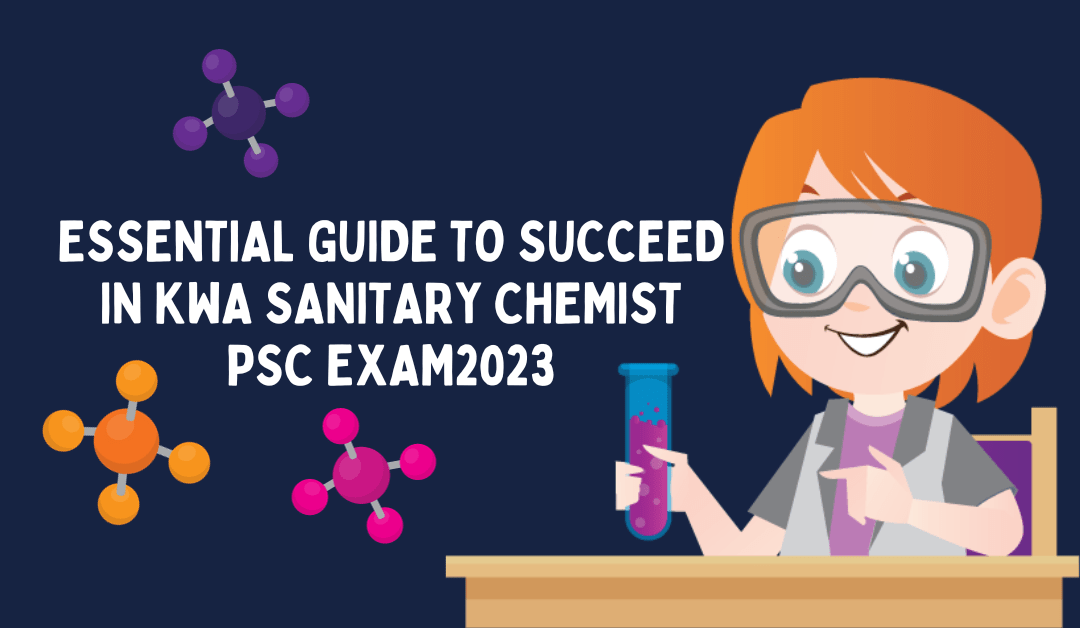
2023 KWA Sanitary Chemist Exam Success Guide
Introduction to the Sanitary Chemist PSC Exam 2023
The Sanitary Chemist PSC Exam is a competitive exam conducted by the Kerala Public Service Commission (KPSC) to recruit eligible candidates for the post of Sanitary Chemist under the Kerala Water Authority. To become a Sanitary chemist on your first attempt it is essential to seek guidance and insights from a reputable coaching center. In Kerala, one such renowned coaching center is iPlus Training Solutions.
The objective of this blog post is to provide Guidance, Tips, and strategies for individuals who are preparing for the post of Sanitary Chemist, by adding these tips into your study routine and seeking guidance from iPlus Training Solutions, you can enhance your chances of success.
Introduction to iPlus Training Solutions
iPlus Training Solutions is renowned as one of the top online coaching centers in Kerala for Kerala PSC, Kerala PSC Technical, UGC NET, Kerala SET, KTET, KV Exams, and Bank exams preparation.
iPlus Training Solutions provides comprehensive customized coaching programs to meet the specific requirements of Kerala PSC, NTA UGC NET, KTET, KV Exams, and Bank exams. With a team of experienced and qualified instructors, iPlus Training Solutions has produced the best results in Kerala.
The Scope of Sanitary Chemist
The scope of a sanitary chemist in Kerala is quite promising. Sanitary chemists play a major role in ensuring the safety and hygiene of various environments, particularly in the context of public health.
Here are some aspects of their scope in Kerala:
- Water Quality Management: Sanitary chemists are often involved in monitoring and maintaining the quality standards of water sources, which is most important in a state like Kerala which has more abundant water bodies. Sanitary Chemists work in industries, government agencies, and research institutions to analyze water samples for contaminants and ensure they meet safety standards.
- Wastewater Treatment: Kerala’s urbanization and industrialization have led to increased wastewater generation. Sanitary chemists work in wastewater treatment plants to develop effective treatment processes and ensure the safe disposal of wastewater, preventing environmental pollution.
- Public Health: Sanitary chemists are the major contributors to public health by inspecting and assessing sanitation facilities in public places, restaurants, and hotels and they ensure that they are maintaining hygiene standards. They play a major role in preventing the spread of diseases through proper sanitation practices.
- Food Safety: In Kerala’s thriving food industry, sanitary chemists help to maintain food safety standards. They analyze food products for contaminants and adulterants and ensure that consumers receive safe and high-quality foods.
- Research and Development: Sanitary chemists have an important role in research to develop new sanitation technologies and methods. They work on projects to improve water purification, waste management, and sanitation practices, which can have far-reaching impacts on public health.
- Government and Regulatory Agencies: Most sanitary chemists aim to find employment with government bodies and regulatory agencies that are responsible for setting and enforcing sanitation and environmental regulations.
- Consultancy Services: Some sanitary chemists start their consultancies and provide expert advice to various industries, institutions, and government bodies on sanitation and environmental management.
- Education and Training: Sanitary chemists can also pursue their careers in educational institutions by teaching and training the next generation of Sanitary Chemists.
Salary of a Kerala PSC Sanitary Chemist
The starting salary of a Sanitary Chemist ranges between Rs.36,500 and 89,000/- per month.
Eligibility Criteria for Kerala PSC Sanitary Chemist 2023
The Kerala Public Service Commission has set a few criteria for the selection of qualified candidates for the position of Sanitary chemist. The candidates who are applying for the post need to verify that they meet all the criteria which are outlined by Kerala Public Service Commission. Applications of the individuals who do not meet the criteria will be rejected.
- Age Limit:
Candidates age limit should be 18 to 36 (For all the communities)
Candidate’s DOB should be between 02.01.1987 and 01.01.2005 - Education Qualifications:
Applicants must hold a Bachelor’s Degree in Science with Chemistry, Microbiology, or Biochemistry as their major subject, or an equivalent qualification obtained from a recognized University, National Institutes under the Central Government, or Institutions established by the Government of Kerala.
The Selection Process for Sanitary Chemists by the Kerala Public Service Commission in 2023.
The Kerala Public Service Commission (KPSC) is conducting online recruitment for the position of Sanitary Chemist in 2023. The latest recruitment notification, Category No. 127/2023, has been issued by the exam board for the Kerala Water Authority. The official notification for the Kerala PSC Chemist exam 2023 has also been released, and the exam will be coordinated by the Cooperative Marketing Federation Products Limited Department.
The selection process will have three different stages
- Written Test: –
- The exam is for 100 marks.
- The exam time is 3 hours.
- You need to carry the admit ticket for the exam hall.
- The questions will be asked about Chemistry, Microbiology and Biochemistry.
- The exam paper includes multiple-choice questions (MCQs).
- The medium of examination will be English.
- Personal Interview: –
After the written exam, the next step in the Kerala PSC Sanitary Chemist selection process is an interview. Only candidates who score above the minimum cut-off marks will be invited for the interview.During the interview, your documents will be verified and you will be asked questions to assess your mental skills, language skills, and approach to answering questions.The list of shortlisted candidates will be published on the official KPSC website.
- Document Verification: –
For the Kerala PSC Sanitary Chemist interview, you must bring
- Color Printout of Kerala PSC Sanitary Chemist admit card for Phase-II
- Printout of duly filled application form
- Copies of passport-size color photograph
- Original and photocopies of matriculation, Intermediate, and degree certificates
- PG mark list and scorecard (if any)
- Experience certificate (if any)
- Certificates as proof of age, caste, and income (if required)
- Personal ID card
- Latest passport size photo
Detailed Syllabus for the Sanitary Chemist PSC Exam
The detailed syllabus for KWA Sanitary chemists will be published by PSC before the exam. The Sanitary Chemist PSC Exam covers a wide range of subjects. In this section iPlus Training Solutions has provided a breakdown of the syllabus, emphasizing the key topics that candidates need to focus on during their preparation.
- Inorganic and organic chemistry
Candidates should have a solid understanding of inorganic and organic chemistry concepts. This includes topics such as chemical bonding, periodic table trends, coordination compounds, organic compounds, and functional groups. Familiarity with chemical reactions, reaction mechanisms, and their applications in various industries is also crucial. - Microbiology and biochemistry
Microbiology and biochemistry play a significant role in the Sanitary Chemist PSC Exam. Candidates need to have knowledge of microbial growth and control, microbial identification techniques, and biochemistry of microorganisms, enzymes, and metabolic pathways. Understanding microbiological techniques used in water quality analysis is particularly important. - Water and wastewater treatment
This subject is the heart of the Sanitary Chemist PSC Exam. Candidates must have a comprehensive understanding of various water and wastewater treatment processes, such as coagulation, flocculation, sedimentation, filtration, disinfection, and sludge treatment. They should also be familiar with the principles and applications of water quality monitoring and analysis. - Environmental regulations and laws
Candidates should be well-versed in the environmental regulations and laws governing water and wastewater management. They need to understand the legal framework, policies, and guidelines related to environmental protection, water quality standards, pollution prevention, and waste management. Knowledge of international conventions and treaties related to environmental sustainability is an added advantage.
How to Prepare Effectively for the Sanitary Chemist PSC Exam 2023
Preparing for the Sanitary Chemist PSC Exam requires a well-structured study plan, essential study materials, and resources, keeping all this in mind iPlus Training Solutions has created a course for the Sanitary Chemist PSC Exam 2023 and we guide you to prepare effectively for time management, and regular practice. If you opt out of our course which is created with the right strategies you can significantly enhance the chances of success in this competitive examination in your first attempt.
- Strategies to create a study plan
Creating a study plan is crucial to ensure systematic and organized preparation. Candidates should allocate sufficient time for each subject based on their strengths and weaknesses. It is advisable to include regular revision and time for mock tests in the study plan to evaluate progress. - Essential study materials and resources
Choosing the right study materials and resources is paramount for effective preparation. Referring to textbooks, reference books, and online resources that cover the entire syllabus thoroughly can provide a comprehensive understanding of the concepts. Candidates should also make use of previous year’s question papers and mock tests to assess their knowledge and identify areas for improvement. - Tips for effective time management during preparation
Time management plays a crucial role in the success of exam preparation. Candidates should prioritize their study sessions, allocate specific time slots for different subjects, and focus on areas that require more attention. Creating a daily and weekly study schedule can help in utilizing time efficiently. - Essential study materials and resources
Choosing the right study materials and resources is paramount for effective preparation. Referring to textbooks, reference books, and online resources that cover the entire syllabus thoroughly can provide a comprehensive understanding of the concepts. Candidates should also make use of previous year’s question papers and mock tests to assess their knowledge and identify areas for improvement. - Tips for effective time management during preparation
Time management plays a crucial role in the success of exam preparation. Candidates should prioritize their study sessions, allocate specific time slots for different subjects, and focus on areas that require more attention. Creating a daily and weekly study schedule can help in utilizing time efficiently. - Importance of mock tests and previous year papers
Mock tests and previous year’s question papers are invaluable resources for exam preparation. They help candidates familiarize themselves with the exam format, assess their understanding of the concepts, and identify areas that need improvement. Regular practice of mock tests also helps in improving time management and building confidence.
Exam-Specific Techniques and Tips
To excel in the Sanitary Chemist PSC Exam, candidates must apply exam-specific techniques and tips during their preparation. These techniques can help in managing time effectively, utilizing mark allocation efficiently, and handling multiple-choice questions with ease.
Time management during the exam
Time management plays a crucial role in the success of any exam. Candidates should practice solving questions within a specified time limit to improve their speed and efficiency. Allocating time for each section based on its weight and difficulty level can help ensure that all questions are attempted.
Effective utilization of mark allocation
Understanding the mark allocation for different sections can assist candidates in strategically allocating time and effort. Candidates should focus on high-mark sections while ensuring that they attempt questions from all sections to maximize their overall score.
Tips for handling multiple-choice questions
Multiple-choice questions can be challenging due to the presence of distractors. Candidates should read the questions carefully, analyze the options critically, and eliminate the unlikely answers first. Guessing can be an effective strategy when the correct answer is uncertain, but it should be used judiciously to avoid negative markings.
How to handle difficult or unfamiliar questions
Encountering difficult or unfamiliar questions during the exam can be daunting. In such situations, candidates should remain calm and not panic. It is advisable to utilize the time allocated for such questions effectively by analyzing the given information, applying logical reasoning, and estimating the most probable answer.
Exam Day Guidelines and Dos/Don’ts
The day of the exam can be daunting yet exciting for candidates. Following certain guidelines, adhering to dos and don’ts, and managing stress and anxiety is crucial for optimum performance.
- Carry Important documents required at the examination center
Candidates should ensure that they carry all the necessary documents to the examination center. These may include the admit card, valid ID proof, and any other documents specified in the admit card or official notification. Arriving at the center well before the reporting time is advised to avoid any last-minute rush. - Dos and don’ts during the exam
During the exam, candidates should focus on maintaining a calm and composed mindset. They should carefully read the instructions provided, verify the correctness of their answer sheets, and manage time effectively. It is important to avoid any malpractice, such as copying or seeking unauthorized assistance, as it can lead to disqualification. - Tips to manage stress and anxiety on the exam day
Exam day can be stressful for candidates, but effective stress management techniques can help in maintaining a clear and focused mind. Techniques such as deep breathing, positive self-talk, and visualization exercises can calm nerves and enhance concentration. Prioritizing self-care, including sufficient rest and a balanced meal, is essential for achieving mental and physical well-being.




